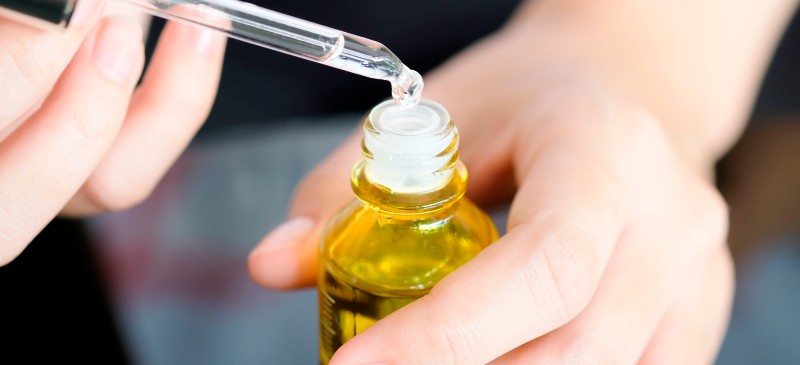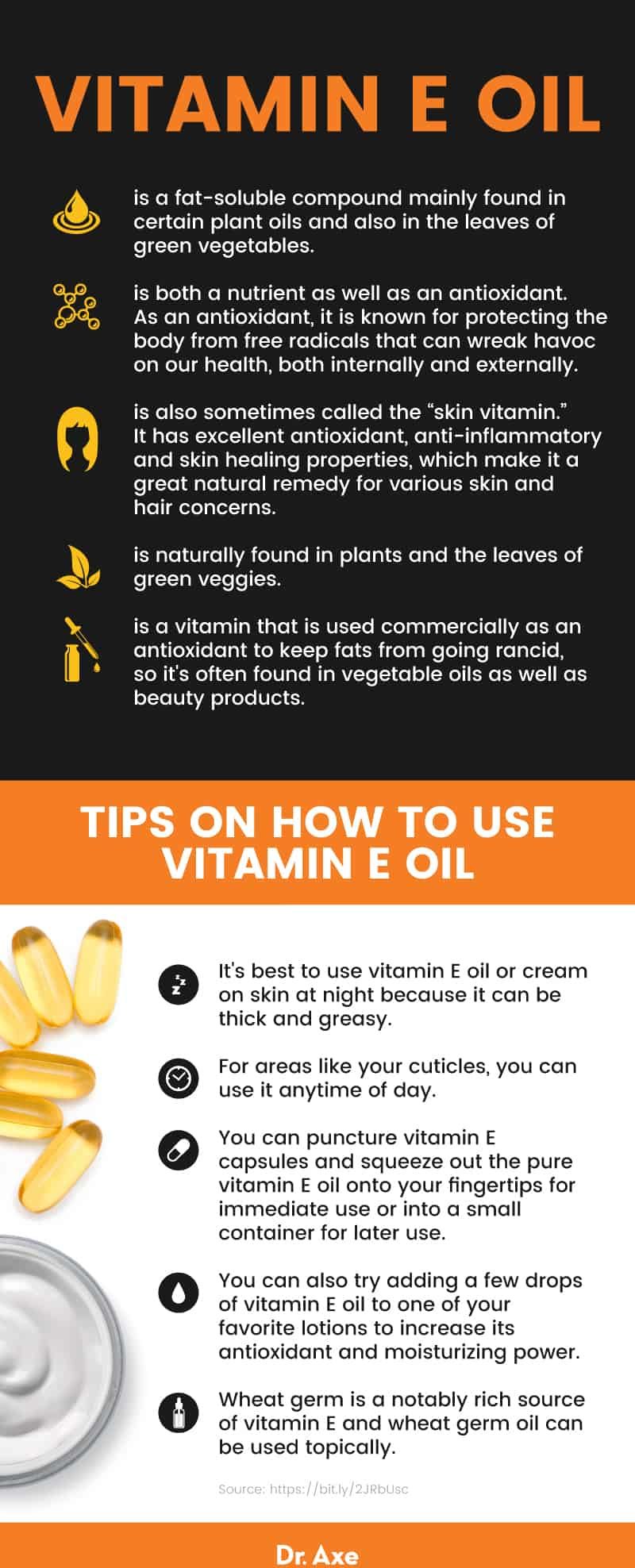
Is vitamin E oil good for your skin? Vitamin E is both a nutrient and antioxidant with a history of use in dermatology for over 50 years. Scientific research demonstrates that it benefits a number of common skin concerns including burns, scars and wounds.
If you look at the skin care products you currently own, you’ll likely find vitamin E in many of them. Vitamin E is a prevalent ingredient in both natural and store-bought cosmetics since it acts as a natural stabilizer and can prolong the shelf life of cosmetic products.
So in addition to all of the general vitamin E’s benefits for health, there are also several possible benefits of vitamin E oil for skin and even vitamin E oil for hair.
What Is Vitamin E?
Vitamin E is a fat-soluble compound mainly found in certain plant oils and also in the leaves of green vegetables. Wheat germ oil is one plant oil that is especially high in vitamin E.
Vitamin E is both a nutrient as well as an antioxidant. As an antioxidant, it protects the body from free radicals that can wreak havoc on our health, both internally and externally.
There are eight major forms of naturally occurring vitamin E: alpha-tocopherol, alpha-tocotrienol, beta-tocopherol, beta-tocotrienol, gamma-tocopherol, gamma-tocotrienol, delta-tocopherol and delta-tocotrienol. Alpha-tocopherol is the most abundant vitamin E in human tissue and is the only form “recognized to meet human requirements,” which means it is the form used to reverse vitamin E deficiency symptoms.
Interesting Facts:
- Vitamin E was first recognized in 1922, but it wasn’t identified chemically until 1938.
- Vitamin E is naturally found in plants and the leaves of green veggies. Check out the Top 10 Vitamin E Rich Foods.
- Vitamin E is both a nutrient and an antioxidant.
- Wheat germ is a notably rich source of vitamin E and wheat germ oil can be used topically.
- It’s a vitamin that is used commercially as an antioxidant to keep fats from going rancid, so it’s often found in vegetable oils as well as beauty products.
- Vitamin E that comes from natural food sources is typically listed as ”d-alpha-tocopherol” on food packaging and supplement labels.
- Vitamin E is the most abundant fat-soluble antioxidant found in human skin.
- For alpha-tocopherol, amounts usually range from 100 to 1,000 international units per serving.
Benefits for Skin and Hair
Vitamin E, also sometimes called the “skin vitamin,” has excellent antioxidant, anti-inflammatory and skin healing properties, which make it a great natural remedy for various skin and hair concerns.
What is vitamin E oil good for? Benefits of vitamin e oil include:
1. Skin Protectant
As an antioxidant, vitamin E is known to help fight free radicals. Studies indicate that when used topically, it can also act as a protectant from skin damage due to sun exposure.
A study published in the Journal of the American Academy of Dermatology compared the effects of vitamin C, vitamin E and a combination of the two antioxidants using an animal model. The researchers found that a combination of topical vitamins E and C offered superior UV skin protection compared to equivalent concentration of topical vitamin C or topical vitamin E alone. However, both vitamin E and vitamin C were shown to offer protection from the sun and reduce sunburn cell formation individually as well. But when combined the effects were even greater.
You can look for a natural chemical-free sunscreen that contains antioxidants like vitamin E and C. If you do end up getting too much sun, is vitamin E oil good for a sunburn? Products like vitamin E oil, vitamin E cream or vitamin E ointments can help to aid a sunburn’s healing process.
2. Improves Dry Skin and Cuticles
In general, vitamin E oil is rich and thick and loved by many for its ability to improve dry, flaky skin. Like coconut oil for skin, you can use vitamin E oil on your cuticles and lips to prevent and soothe chapped skin.
For dry cuticles, try this DIY Cuticle Cream, which very intentionally includes therapeutic vitamin E oil.
3. May Help Scars and Burns
Is vitamin E oil good for acne scars? One of many vitamin E oil uses is for scars, including acne scars. While research has been mixed, many people tout the helpfulness of vitamin E oil for scars.
One clinical single-blind study that showed positive results was published in 2010 in the Journal of Plastic, Reconstructive & Aesthetic Surgery. In this study, child subjects who had recently undergone surgery either had topical vitamin E applied to the incision area for a minimum of 15 days three times daily before surgery and for at least 30 days after surgery two times daily. Meanwhile, the control group had a topical petrolatum-based ointment applied to the incision site in the same manner.
What did they find? There weren’t any children in the vitamin E group who developed scars, but in the control group, 6.5 percent had developed scars after six months.
In a 2021 animal study, wheat germ oil — loaded with vitamin E, B-complex, squalene and unsaturated fatty acids — was used topically to treat wounds. It induced wound healing, including a 90 percent reduction in wound size within three weeks.
4. Fights Wrinkles
Many people are looking for the best natural ways to prevent wrinkles and other signs of aging. Vitamin E oil may help improve fine lines and wrinkles by providing an antioxidant boost that protects from sun damage and encourages the healthy growth of new skin cells.
READ RELATED: What Is Sodium Lauryl Sulfate? Where It’s Found + Risks
When used both internally and externally, studies indicate that antioxidants can fight free radicals and photo-induced skin aging, including wrinkles and dark spots. It’s not surprising that many of the top anti-aging oils like jojoba oil naturally contain vitamin E.
Vitamin E oil can help decreasing skin dryness and therefore make signs of aging less noticeable. Dry skin accentuates fine lines and wrinkles as well as sagging, creping and flaking of the skin. So if you can address dryness, then you can also help your skin to appear more youthful.
5. Hair Booster
You can also use vitamin E oil for hair, especially when you’re looking to improve dry hair and/or dry scalp. According to Dr. Stafford R. Broumand, “There have been some studies to show that vitamin E oil may increase circulation to the scalp. This temporarily increased blood flow to the area could help to enhance the health and strength of the hair follicles. Vitamin E oil can also work to hydrate and moisturize dry, brittle hair.”
6. May Help Treat Eczema
Eczema symptoms can include itchy and inflamed skin with blisters or crusty patches that may crack open, ooze and become scaly. Research has shown that low doses of vitamin E taken internally can be an effective eczema treatment with no side effects.
One randomized, double-blind, placebo-controlled trial looked at the effects of vitamin E supplementation (400 international units per day) on 70 participants with mild-to-moderate atopic dermatitis — more commonly known as eczema. Overall, the study concludes that vitamin E can improve symptoms and overall quality of life in people struggling with eczema.
Unfortunately, there has not been a lot of research on using vitamin E oil topically for eczema relief, but it may increase the effectiveness of topical moisturizers.
How to Use
When using vitamin E topically, at night is the preferred time since the oil can be quite thick and greasy. If you’re using the pure oil, it only takes a few drops massaged into the area of concern to see positive effects. Putting some vitamin E oil on your face overnight is especially a good idea because it can make your face appear very shiny and also make it difficult to put makeup on. For areas like your cuticles, you can do use anytime of day.
You can puncture vitamin E capsules and squeeze out the pure vitamin E oil onto your fingertips for immediate use or into a small container for later use. Using vitamin E oil capsules provides a pure concentrated form of vitamin E. If you have sensitive skin, you can look for a vitamin E oil that also includes other natural oils.
To use vitamin E oil for facial concerns (like wrinkles, acne, etc.) or for anywhere on your body, you can use either vitamin E oil or vitamin E cream. You can also try adding a few drops of vitamin E oil to one of your favorite lotions to increase its antioxidant and moisturizing power. Another option is to use wheat germ oil for hair and skin since it is a rich source of vitamin E.
Is vitamin E oil good for your eyelashes? Some people say they like to use vitamin E oil on their eyelashes to promote growth; however, there isn’t any scientific evidence or even many qualified testimonials of using vitamin E on lashes. Plus, you could very easily end up getting the oil in your eyes.
Look for a naturally-occurring vitamin E oil, which will likely be labeled as “natural” or d-alpha-tocopherol. Synthetically-made vitamin E oil is all-rac-alpha-tocopherol, which is commonly labeled as dl-alpha-tocopherol. (3)
Vitamin E oil should always be stored in a dark, cool place.
DIY Recipes
Vitamin E oil can be used in many different homemade recipes for skin health, such as these:
Possible Side Effects and Caution
Can you apply vitamin E oil directly to skin? Yes, you can. But before using vitamin E oil, it’s always wise to perform a patch test to ensure you don’t have an unwanted reaction to the oil.
When it comes to how to use vitamin E oil on face, it’s best to do so at night. However, if you have acne-prone or sensitive skin, you may find that vitamin E oil is not the best choice for you, especially for your face. The goods news is that you can still likely use it with no problems on other areas of your body, like your cuticles or your hair.
Tocopheryl acetate is a man-made form of vitamin E that takes natural vitamin E and adds acetic acid to it. Tocopheryl acetate is a potentially irritating form of vitamin E to watch out for in cosmetics and body care products.
Many topical vitamin E products like vitamin E oil can contain additional and sometimes questionable ingredients. Always read labels carefully and talk to your dermatologist if you’re unsure of the best vitamin E product for you.
Beware of the fact that vitamin E oil, like other oils, may stain bedding or clothing.
Final Thoughts
- When used topically, there are many possible vitamin E oil benefits for the skin as well as the hair.
- Skin benefits range from helping dry skin to sunburn to eczema.
- Look for vitamin E oil in its natural form (d-alpha-tocopherol) from a reputable company.
- Vitamin E oil capsules can be opened and the oil can be used topically.
- Always store vitamin E oil in a cool, dark place.
Source: Dr. Axe






